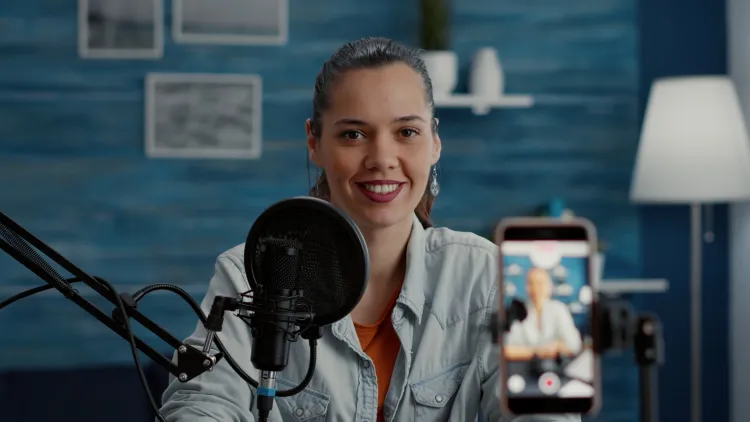Being a successful coach or consultant is all about building trust. While it’s important people know who you are and understand what you offer, the key factor is demonstrating that you’re the real deal. A true expert - whose time and advice is worth paying for. And that’s not easy.
In essence, it comes down to establishing a strong personal brand. “Personal branding” has become a bit of a vague buzzword in recent years, especially on places like LinkedIn. But when you cut through the hype, the core concept is simple. John Jantsch, author of Duct Tape Marketing summed it up neatly:
Personal branding is the art of becoming knowable, likeable, and trustable.
Podcasting can help you master that art form.
Why Podcasting is Perfect For Coaches & Consultants
These days, when people are interested in learning more about a topic (digital marketing, health & wellness, sales coaching etc) they turn to podcasts. Because they know that’s where they’re likely to find the most reliable and detailed information.
Podcasting allows you to share your knowledge and expertise with an audience of hundreds (often even thousands) of people specifically interested in hearing from you as the expert. With each episode you release, you establish more trust with your audience and cement your credibility as a true authority in your field.
And when the time comes when a listener needs to achieve bigger or faster results, guess who they’ll seek to hire as their coach or consultant? With this in mind, there are two main ways you can use podcasting to get more coaching clients:
- Starting your own podcast
- Appearing as a guest on other podcasts
In this article, we’ll outline how you can use both approaches to expand your reach and encourage clients to come to you, not the other way around.
You’ll get the best results if you use both of these methods together. Being a guest on other shows is one of the best ways to promote your own podcast.
But if you’re pressed for time and haven’t got the capacity to launch your own show, we recommend focusing your efforts on podcast guesting initially. Once you see results, you can double down on your commitment by launching your own podcast.

Get booked on podcasts the easy way
With more than 70,000 members, MatchMaker.fm is the largest online community connecting podcasters & guests.
Join MatchMaker todayPodcasts Have Gone Mainstream

Before we get into specifics, let's take a quick look at the numbers. According to recent statistics:
- 55% of Americans have listened to a podcast at least once. That’s up from 51% in 2019. Remember, in 2010 most Americans didn’t even know what a podcast was. The media landscape has shifted significantly over the last decade.
- Regular podcast listeners now listen to an average of seven podcast episodes a week. That’s up 40% since 2017. That’s a lot of one-on-one time with their favourite hosts.
- The majority of podcast listeners fall into the 18 - 35 age category. People at the beginning of their chosen career paths are often more likely to invest in coaching.
- Podcast listeners are also better educated than average and also tend to have higher average incomes. More disposable cash means they are more likely to be able to make an investment in coaching or consulting.
As a coach or consultant, you can no longer afford to ignore this rapidly growing pool of potential clients. Whatever your area of expertise happens to be, there are listeners out there waiting to hear from you.
Getting The Most From Podcasting
There are a few things important to make clear before we get to the how-to sections. To get the best possible results from podcasting, your coaching or consulting business model must meet one essential criteria:
You MUST have a well-defined target audience.
This is a prerequisite for success whether you’re starting your own podcast or simply guest podcasting on other shows.
It means the services you provide must be focused on a niche topic and geared towards a very specific group of people e.g. financial advisory services for freelance creatives, recent graduates aiming to secure entry-level roles in competitive industries, gym owners who want to maximise their membership revenue etc.
If you are a general mindset or life coach who sells services to anybody and everybody, podcasting probably won’t work well for you as a strategy. Without a clearly defined niche to occupy and cater to, it’ll be very hard to find an audience for your content.
On the other hand, if you’re a life coach who sells to a more specific group of people, such as C-level executives who suffer from imposter syndrome or working mums who run their own business, your chances of success are much higher.
In essence, the narrower your target audience, the better results you’ll have with podcasting.
Alongside having a clearly defined target audience, there are a couple of other things that can help boost your success, especially when it comes to launching your own podcast. These aren’t essential, but they do make things a bit easier:
An Existing Email List
If you’ve been coaching or consulting for a while, chances are you’ve been working on building your email list. If you’ve already got more than 500+ people in that list, it gives you a solid headstart for your podcast. These are individuals who you already know are interested in your services, and your first 100 listeners are likely to come from this group.
If you haven’t got an existing email list, don’t worry. Simply create it alongside your podcast and work to grow both simultaneously. It’ll take a bit longer to get things off the ground, but you can still achieve solid results given enough time.
Ability to Work Remotely
Being able to work with clients who are not in your local area is also a big advantage. People can tune into your podcast from all over the world, so if you have the potential to convert all those listeners into clients, that’s ideal. And given the recent restrictions imposed by COVID-19, most coaches and consultants have already embraced a fully remote way of working.
Case Study - Azzouz Branding
Hishem Azzouz offers training and coaching for recruiters who want to expand their network through content and inbound marketing. And he’s used podcasting to become one of the most well-recognised coaches in his industry.
Note that Hishem sells to a very specific group of people.
Hishem hosts The Recruitment Mentors Podcast which brings to life the failures, learnings, and successes of recruiters and recruitment agency owners. The show is a goldmine of information for junior recruiters who want to learn from the experience and insight of some of the most successful professionals in the business.
By promoting and marketing each episode to his LinkedIn network, Hishem is able to pull in multiple pre-qualified leads each week. He doesn’t have to spend any time convincing potential clients of his expertise or the value of his service. His podcast takes care of all that. It’s popularity and success is proof in itself he knows what he’s talking about when it comes to marketing and content creation.
When Hishem’s phone rings, people immediately want to speak about bringing him in and how much it will cost.

We spoke to Hishem last year about everything he did to turn The Recruitment Mentors Podcast (formerly The Recruitment Rollercoaster Podcast) into a success. You can check out the full conversation below for more details:
No matter what form of coaching or consulting you offer, podcasting gives you the opportunity to prove you’re the real deal. If the information you provide for free in your episodes is genuinely helpful, your listeners will come straight to you when they need bigger results.
Starting a Podcast That Gets You More Clients
Succeeding with your podcast is all about building a deep understanding of your ideal clients and building your show based on those insights. Below we’ve outlined a step-by-step process you can follow to launch a podcast that resonates with the right kind of people.
Start With Who
We’ve been over this already, but it’s worth repeating. Who are you trying to reach? Before you get going, you need to answer two key questions about your coaching business:
1. Who are your current best clients?
- Who are your most profitable clients?
- Who do you most enjoy working with?
- Which clients are most likely to refer others to your business?
2. What problem do you solve for those clients?
Your answer to the first question should help you further narrow down your target audience. These are the people you’ll design your podcast for. The answer to the second question will help guide the kind of content you create.
With these answers to hand, planning everything becomes much easier. Every time you need to make a decision in relation to your podcast, just refer back to one simple question:
What’s in the best interests of my ideal clients?
At this point, you’re ready to begin mapping out a roadmap for your podcast.
Choosing a Format
The vast majority of coaching and consulting podcasts tend to fall into two main categories:
Teaching format: Where you simply record yourself talking about your area of expertise.
Interview format: Where you talk to influencers and thought leaders from your space.
Producing an interview podcast is generally easier than producing a teaching / solo podcast. It takes less time. In an interview you simply have to ask the right questions and your guest will supply you with great content. If it’s only you behind the mic, it takes a bit more time to plan out what you’re going to say. Without proper planning before each episode, you’ll probably struggle to build an audience with a solo teaching podcast.
Of course you can always take a hybrid approach - recording some episodes solo and others with guests. Whichever format you choose, as long as your content delivers lots of value for your ideal clients, that’s all that matters. For more on the specifics of these two key formats, check out the guides below:
Episode Length
In terms of how long your episodes need to be, less is often more. If you’re publishing episodes which pass the 1hr mark, that will probably put quite a lot of people off.
Most successful longer podcasts (>1hr) out there today have been around for a long time. They’ve had to work hard for years to earn a regular place in their listeners' lives.
So if you’re just getting started with a brand new podcast, it’s usually best to remain humble and not demand huge chunks of your listeners’ time right out of the gate. 25 - 30 minute episodes is generally a good starting point. That way, potential clients will be more likely to give you a try.
If your listeners do want longer episodes, they’ll let you know in their feedback. You can then gradually extend your episode length over time based on listener demand.
Publishing Frequency
Again, when it comes to frequency, there are no hard and fast rules. But you’ll probably want to maximise your potential reward with the least amount of effort. If that’s the case, then weekly publishing is the way to go. Your audience will still have plenty of content to sink their teeth into, and you won’t be overwhelmed trying to release multiple episodes a week.
Keep in mind that consistency is key. You need to become part of your listeners regular routine. So when you decide on your publishing schedule, stick to it. Missing or skipping weeks because you are busy can be quite costly in terms of lost listeners.
Equipment, Recording, Artwork, Show Notes, etc.
To get your podcast off the ground, you’ll need to make a small investment in equipment. The only significant up front cost is a good microphone, editing and recording software is available free online.
Getting into all the tools and best practices for creating the different elements of your podcast is beyond the scope of this article. However we have written extensively on these topics on our hosting platform, Podcast.co. Check out the guides below for a detailed breakdown of everything you need to know:
- Top 9 Best Podcast Microphones (Budget & Pro)
- The Complete Guide to Recording Podcasts Remotely
- The Step-By-Step Guide to Choosing a Podcast Name
- How to Design Unique & Distinctive Podcast Artwork
- How to Create Great Podcast Show Notes
Producing Content That Converts Listeners to Clients
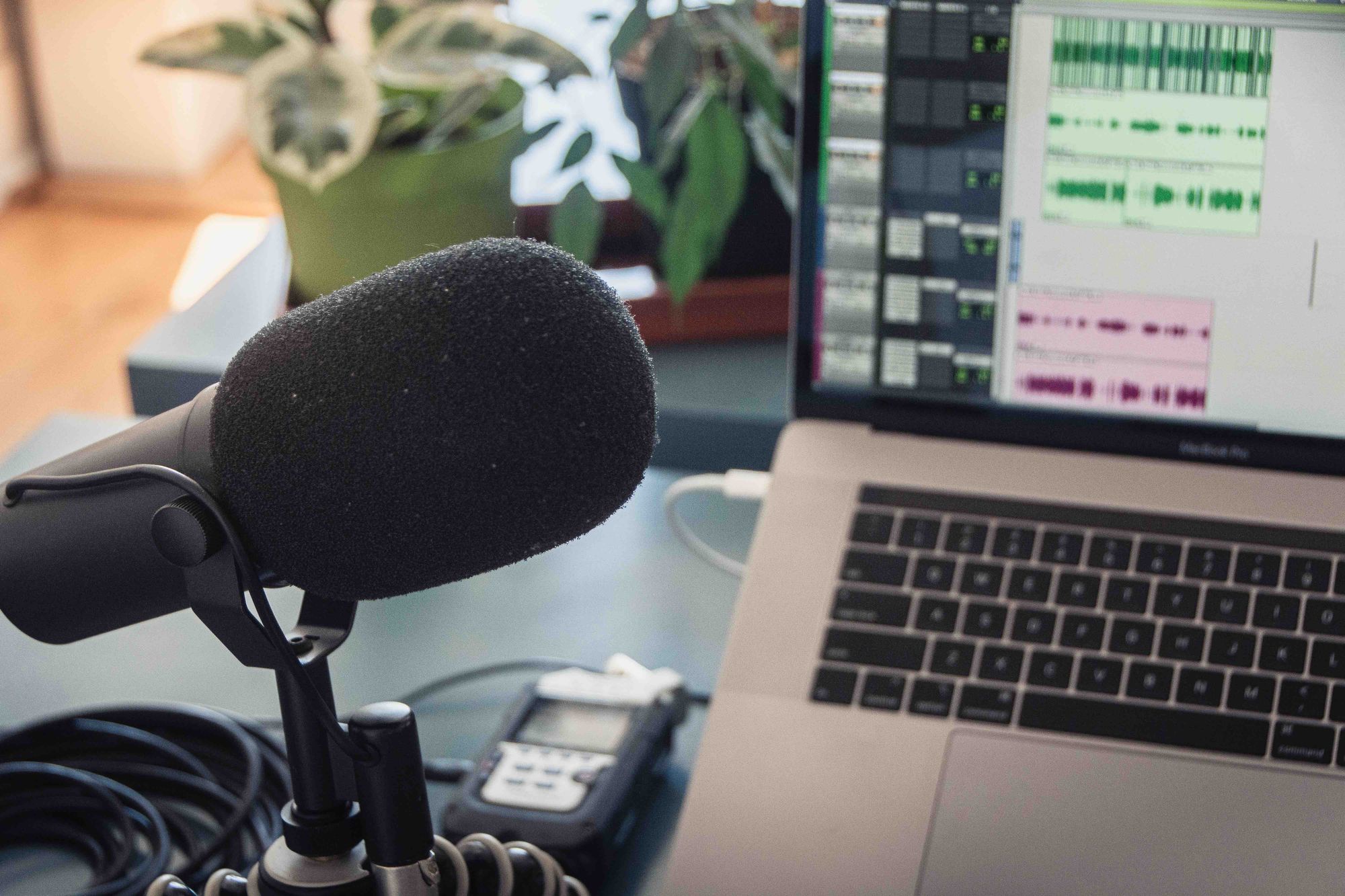
To create content that converts listeners into clients, you need to give valuable, actionable advice in every episode you publish. Your listeners should be able to get results off the back of your podcast before they even begin working with you. That way, they have proof that you are trustworthy and can actually solve their problem.
Teach, educate, and advise. Don’t sell. In fact, if you try and aggressively pitch your coaching or consulting service in your episodes, it’s guaranteed to turn listeners off. The goal is to demonstrate how knowledgeable you are and that your advice actually works in the real world. So when your listeners want bigger results, they’ll come to you.
There are 3 key questions you should ask yourself to come up with great content ideas for your show:
- What questions do you regularly get asked that you can educate listeners on?
- What key concepts do my potential clients need to understand?
- What actions can your listeners take to begin progressing towards their goals?
We recommend sitting down with these questions and doing a brainstorming session. Get everything you can think of down on paper first. Once you’re happy with your list of ideas, then start thinking about how you can organise them in a logical way. Which ideas / episodes should be presented early in the series? And which are best left till later down the line?
For example, your first episode should probably be a solo one explaining who you are, your background and credentials, why you decided to create the podcast, and what listeners should expect to get from it. After that, it might make sense to produce a series of episodes addressing some of the most common mistakes in your field and outlining some of the first steps your listeners can take to make some progress.
With your content roadmap laid out, it allows you to be much more strategic and intentional about who you interview on your show. If you know exactly what topic you’re going to be covering, it allows you to focus on finding a guest who is perfectly positioned to educate your listeners in that area.
For more tips and advice on how to plan out your podcast, check out the three strategies outlined in the video below by MatchMaker founder James Mulvany:
Booking the Right Guests
Even David Letterman can’t do much with a guest who’s stiffer than a plank of wood. You can’t magically make someone interesting through the power of questioning alone. So half the art of recording great content comes down to selecting compelling guests.
MatchMaker.fm simplifies the process. It’s an online platform that connects podcasters with guests. So if you’re looking to find perfect guests for your show quickly, all it takes is a few clicks.
The first step is to create a profile for your podcast. Simply upload your artwork, podcast description, and tagline. For more on how to create the perfect podcast profile, check out this article.
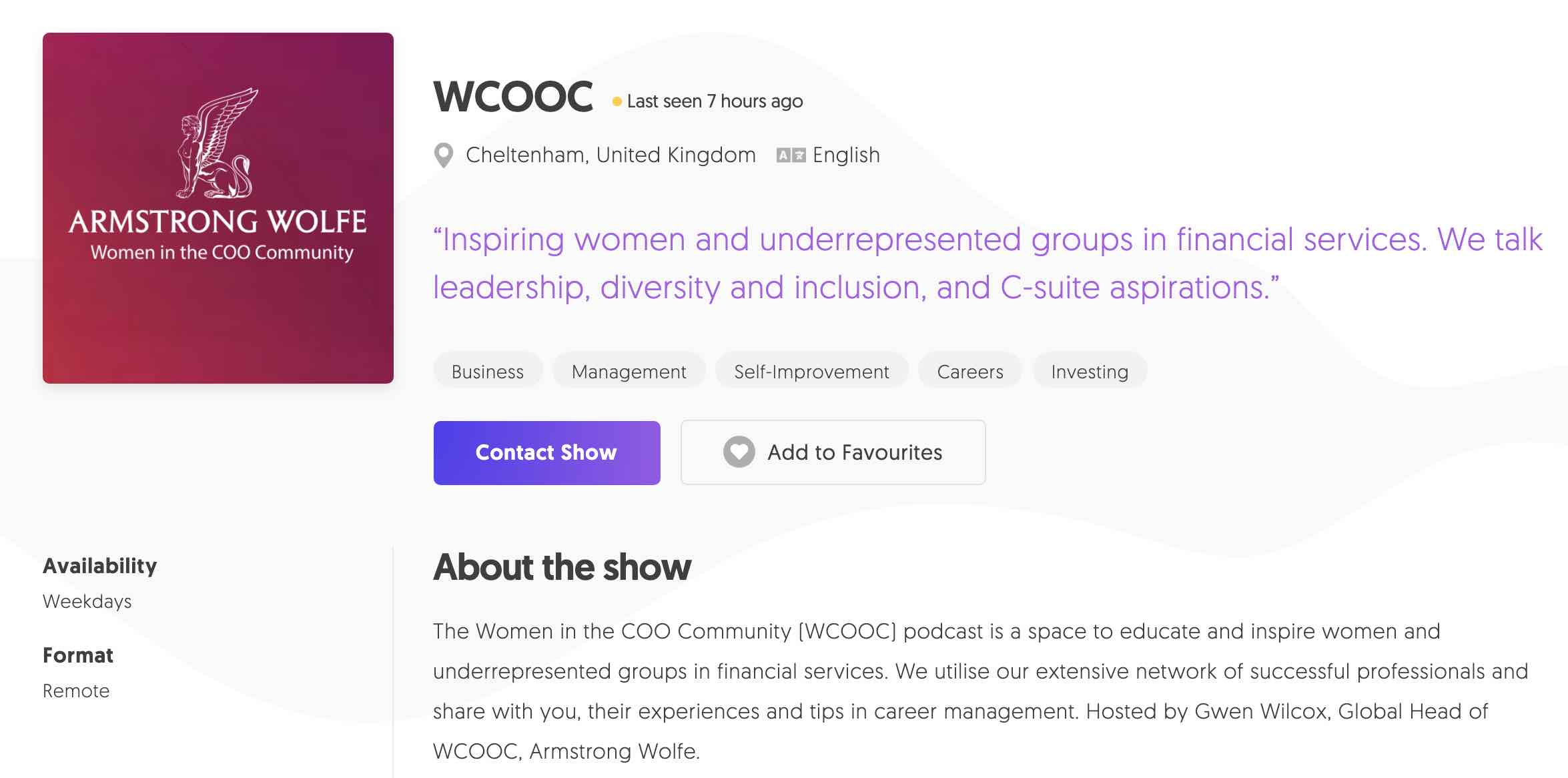
Once you’ve created your podcast profile, then it’s time to search the database of guests. There are thousands to choose from, so the quickest way to narrow down your search is to use filters. You can filter shows by podcast category, location, language, and more.
Unless you want to focus on a specific region or country, the guest category is usually the most relevant filter. Simply pick out the categories that most closely align with your planned episode’s subject matter, and browse the available guests.
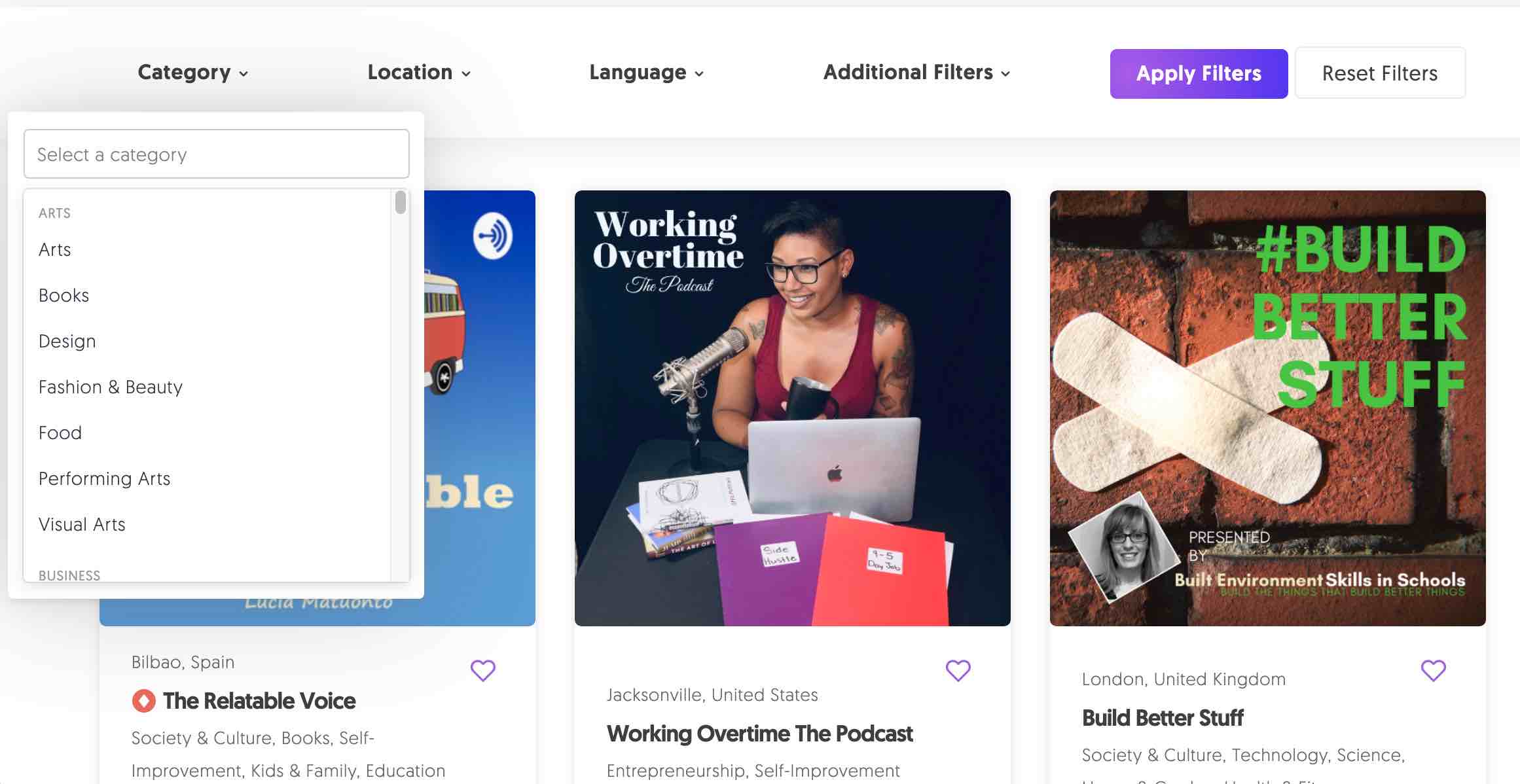
If you spot any guests that look like a good fit, you can quickly add them to your favourites by clicking the heart icon on their profile. We recommend building up a list of 10 -15 suitable guests to begin with (not everyone will say yes!). Once you’ve got your favourites list, you can then reach out to them via MatchMaker’s instant messaging service and invite them on your show. Once confirmed, all you need to do is schedule a time to record the conversation.
Once you’ve got MatchMaker up and running you might also want to take a more hands-on approach to booking guests. Here are a few other approaches you can try:
- LinkedIn - If you’ve already built up your coaching or consulting network on LinkedIn, have a think about which of your existing connections might make good guests. As they’re already familiar with you, you’re more likely to say yes to your invite.
- Find Relevant Authors on Amazon - Authors with books coming out want to get in front of as many people as possible, so even small podcast appearances can help them out. To find authors of upcoming books, do an Amazon search on a topic you want to cover on your podcast, like “workplace stress”. Then change the search from “relevance” to “publication date”.
- Reach out to Bloggers - Chances are there are quite a few popular blogs within your industry. If you find a post that’s well written and matches up with your planned episode, then why not reach out to the author and invite them on your show.
- Attend Events - When you make a face-to-face connection with someone they are much more likely to come on your show. Although most in-person events are on hold during COVID, it’s still worthwhile attending any relevant virtual meet-ups in your industry to see if you can get any of the guest speakers to come on your show.
Appearing as a Guest on Other Podcasts
As mentioned previously, if you’re already quite busy, you might not have enough time to set up your own podcast. But that doesn’t mean you can’t tap into the benefits. As a coach or consultant, appearing as a guest on other podcasts is a great way to reach a wider audience, establish your authority, and win some new clients in the process.
While it won’t bring you as many clients as having your own podcast, it only takes a fraction of the work. You simply have to show up and share your knowledge. There’s nothing you need to create.
If you impress the audience enough, a small percentage of the listeners will want to learn more about you. Of those who make their way to your website, some may be convinced enough to make the commitment and become a paying client.
Again, you can use MatchMaker.fm to make things easier. The first step is to create your guest profile. Simply upload a photo, add your areas of interest, and fill in some basic details about yourself. For more on how to create the perfect guest profile, check out this article.
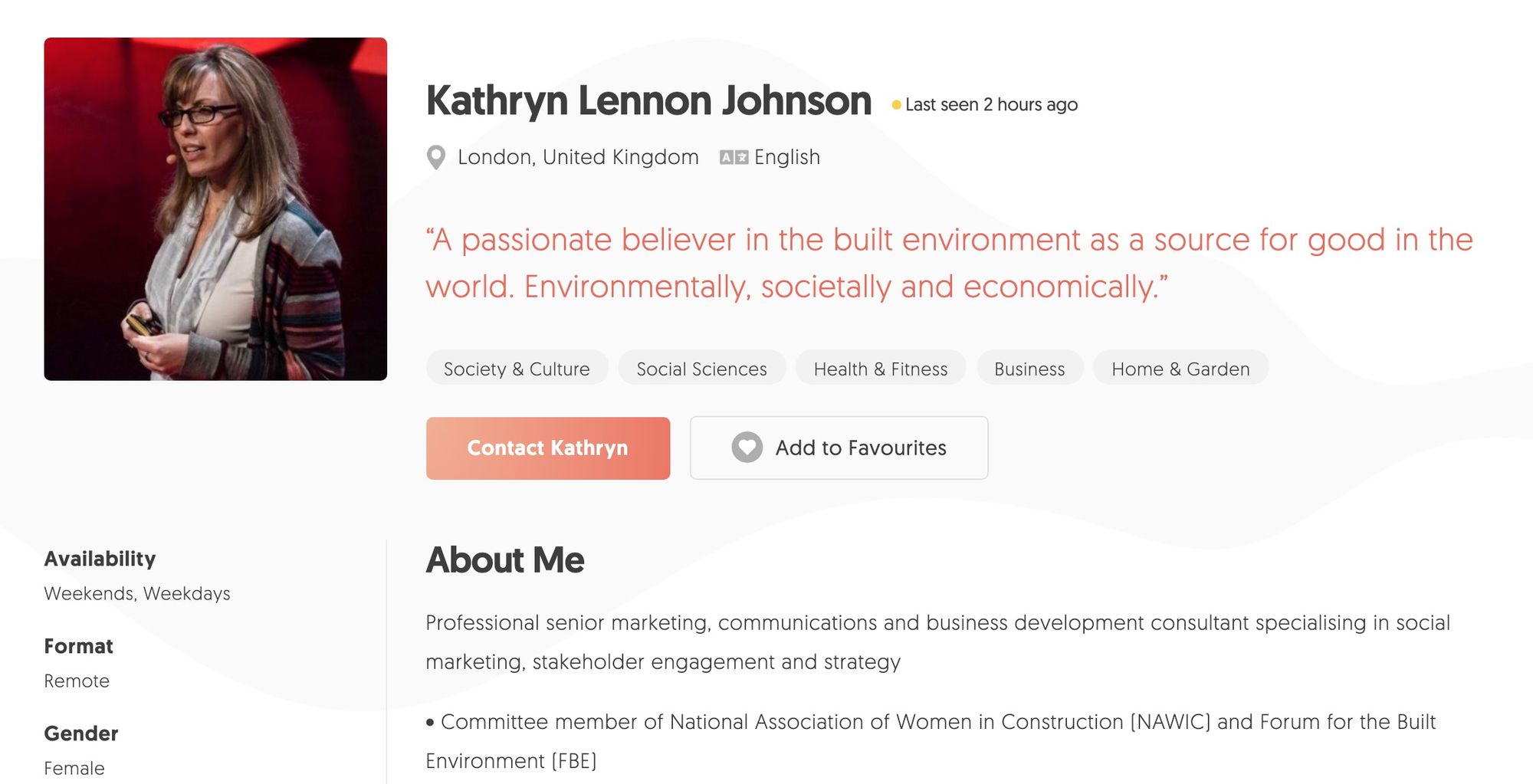
With your profile created, then simply use the category filter to find podcasts that are right for you. Add any that stand out to your favourites list. Then it’s time to get in touch.
How to Write Your Guest Pitch
To get booked, you need to reach out to the hosts on MatchMaker’s instant messaging service and pitch yourself as a guest. To do this, think about what you can bring to the show. This is not just about you selling your coaching services, it’s about you adding value to someone else’s product - a podcast they’ve put a lot of time and effort into building.
The hosts of top podcasts often receive multiple guest pitches a day. And they have no obligation to book you simply because you reached out to them. So to stand out and increase your chances of success, your pitch needs to convey the unique value or perspective you can offer listeners. For more on how to craft the perfect podcast guest pitch, check out this guide.
Conclusion
By implementing these strategies, the number of listeners ready to “take the next step” and hire you as their coach or consultant should begin to gradually increase over time. The longer your podcast runs, the deeper the connection you’ll form with your regular listeners and the more likely they are to convert to clients.
Podcasting is definitely a long-term strategy, and it takes a lot of work. But there are now countless numbers of coaches and consultants who have proven it works. If you have a clearly defined target audience and a service offering that solves a genuine problem, podcasting is one of the most powerful marketing tools out there. Now it’s just a matter of committing and sticking to it.
To get started today, create a profile on MatchMaker.fm and book your first podcast guest appearance.

Get booked on podcasts the easy way
With more than 70,000 members, MatchMaker.fm is the largest online community connecting podcasters & guests.
Join MatchMaker today




